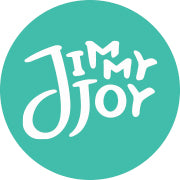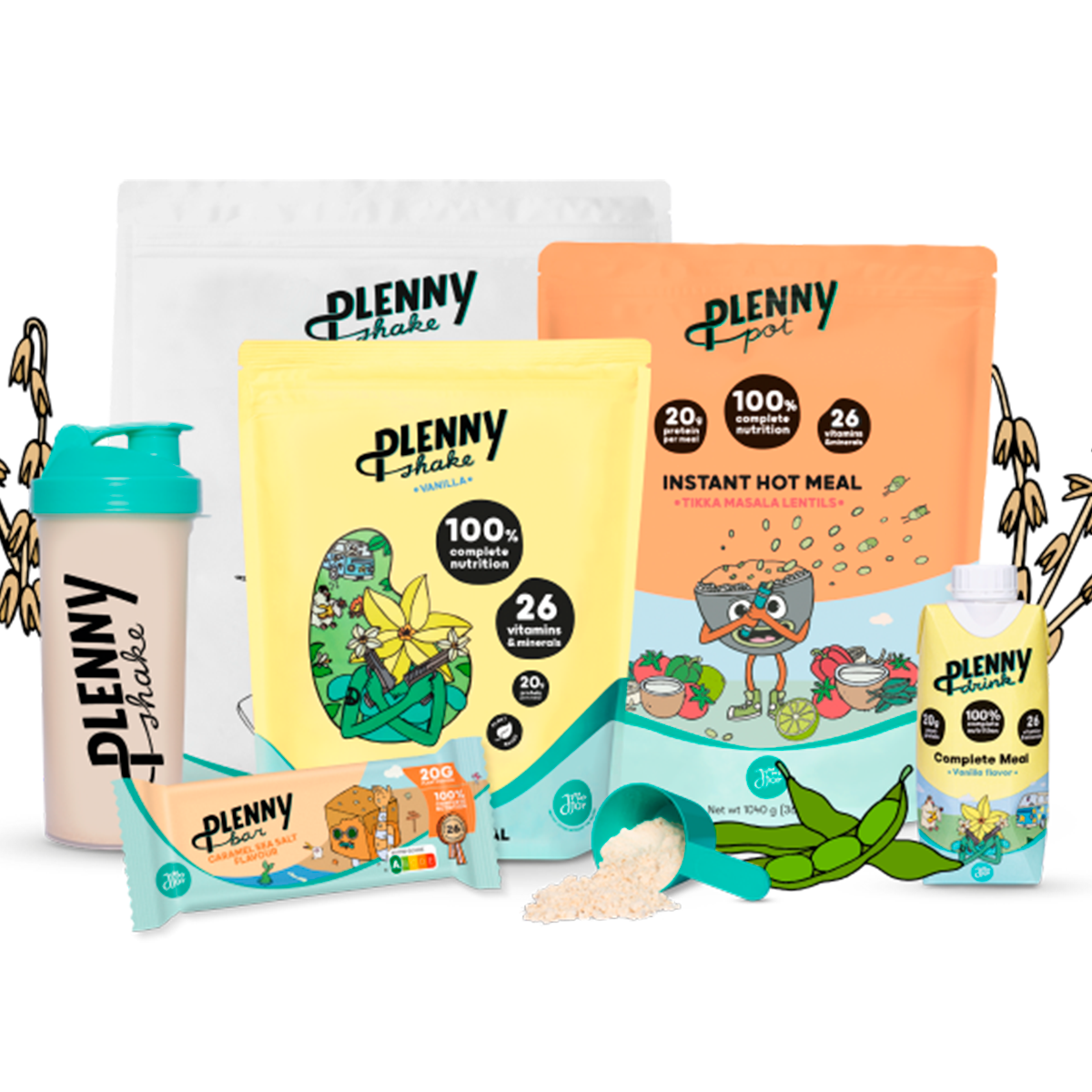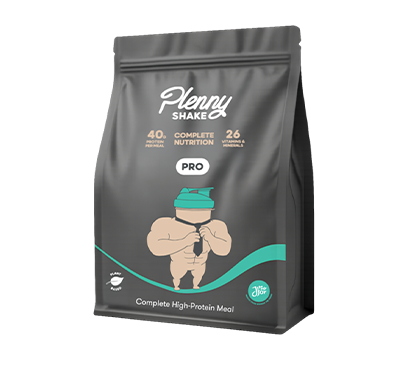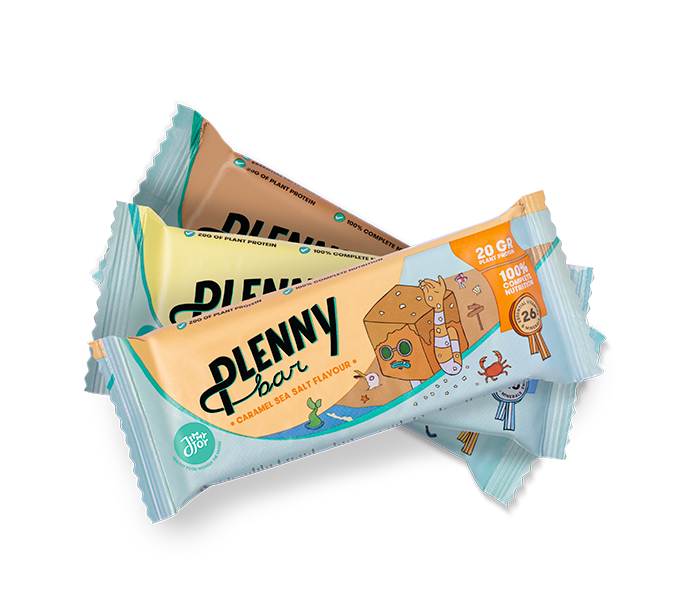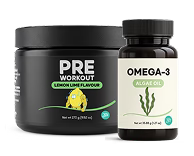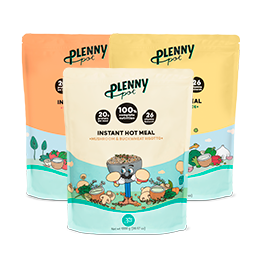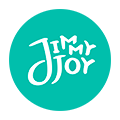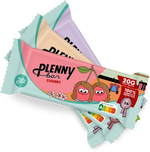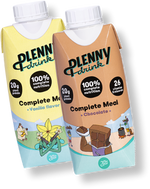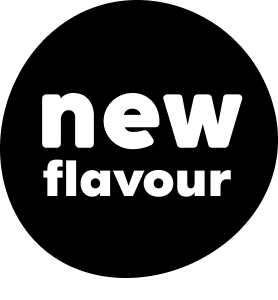Comparación de Plenny Drink v2.0 a v2.1. ¿Qué cambió?

Our mission to create the healthiest meals scientifically possible is never-ending. This time, we accomplished it yet again by creating an even healthier and tastier…
Plenny Drink v2.1!
So what’s new?
- A new vitamins and minerals mix
- Fairtrade cacao for Plenny Drink Chocolate
- More sustainable packaging
- Official Nutri-Score A
A New Vitamins & Minerals Mix
To keep up with the latest nutritional research, we’ve updated our custom blend of vitamins and minerals.
Added Choline
Choline is a relatively recently discovered nutrient: it was only acknowledged as a required nutrient by the Institute of Medicine in 1998.
But choline is involved in many different bodily processes. For example, liver function, healthy brain development, muscle movement, fat transport and metabolism, and DNA synthesis. A deficiency can cause issues like muscle damage, liver damage, and nonalcoholic fatty liver disease (1,2, 4, 5).
That’s why for this update, we outfitted the Plenny Drink with Choline Hydrogen Tartrate. One Plenny Drink v3.0 contains 110mg, which is already 28% of the recommended intake of 400mg/day.
Vitamin B12
The latest findings on the absorption rate of vitamin B12 made us more curious and after some more research we found out that there can be a saturation in the absorption rate. Active absorption is severely limited. Studies state that the absorption efficiency of B12 is lower when B12 content is higher. (10) They showed that the absorption of B12 varies from about 56%, if about 1 microgram or less is consumed, to about 1.3% for doses of 1000 micrograms (1 milligram) or above.
Studies specifically done on cyanocobalamin estimated the absorptive capacity of cyanocobalamin as 49% and another study as 1.5–2.5 μg per meal, which depends on the maximum saturation of the intestine receptors. This is why we decided to lower the amounts added but, of course, make sure that the daily needs and requirements are met. (11-15) In persons with normal absorption, an intake of 4–7 ug of vitamin B12 a day is associated with an adequate vitamin B12 status. (16)
Reviews from EFSA conclude that supplements available on the market usually contain dosages between 1-5 µg. (17) An appropriate overdosing based on the bioavailability of different vitamin forms is 2-4 times more than the established adequate intake (which is 4ug for B12) without exceeding any upper limits if established.
The National Centre for Biotechnology Information states that cyanocobalamin losses in urine have been observed to be 3 times higher than that of methylcobalamin. Although absorption in the blood of both B12 forms was similar, it was found that methylcobalamin supplementation caused 13% more cobalamin to be stored in the liver than did cyanocobalamin supplementation. (17-19)
We use cyanocobalamin because of being the only non-animal form of this vitamin available for the application we need, and taking into account the previous, at 4 times higher than the daily recommended intakes.
Dried purple laver for B12 (Cyanocobalamin)
Dried purple laver is a plant product and the most suitable vitamin B12 source available for vegetarians and vegans. Dried purple laver contains high levels of other nutrients that tend to lack in vegetarian diets, like iron and omega-3 polyunsaturated fatty acids.
That’s why one Plenny Drink v3.0 has 3.2ug of vitamin B12, which amounts to 128% of the daily recommended intake. Sufficient, don’t you think?
Vitamin E, D
Because it's an antioxidant and because of its preservative qualities, we increased Vitamin E. We also increased the vitamin D content, so you’re less dependent on a daily dose of sunlight. Take that, sun!
Selenium
We also increased Selenium in order to meet the latest adequate intake of 70ug/day, established by EFSA (20).
Plenny Drink v2.0 vs v2.1 vitamins & minerals
|
Plenny Drink |
|
V2.0 |
V2.1 |
||
|
Vitamins-Minerals |
Unit |
Per portion |
RI* (%) |
Per portion |
RI * (%) |
|
Vitamin A |
μg |
160 |
20% |
160 |
20% |
|
Vitamin D |
μg |
3 |
61% |
5 |
100% |
|
Vitamin E |
mg |
2.4 |
20% |
4 |
33% |
|
Vitamin K |
μg |
16 |
21% |
16 |
21% |
|
Vitamin C |
mg |
40 |
50% |
40 |
50% |
|
Thiamin |
mg |
0.2 |
20% |
0.4 |
36% |
|
Riboflavin |
mg |
0.3 |
23% |
0.3 |
23% |
|
Niacin |
mg |
3.6 |
23% |
3.6 |
23% |
|
Vitamin B6 |
mg |
0.3 |
22% |
0.4 |
29% |
|
Folic Acid |
μg |
60 |
30% |
60 |
30% |
|
Vitamin B12 |
μg |
28 |
1120% |
3.2 |
128% |
|
Biotin |
μg |
10 |
20% |
10 |
20% |
|
Pantothenic acid |
mg |
1.2 |
20% |
1.2 |
20% |
|
Potassium |
mg |
400 |
20% |
400 |
20% |
|
Chloride |
mg |
160 |
20% |
279 |
35% |
|
Calcium |
mg |
185 |
23% |
185 |
23% |
|
Phosphorus |
mg |
140 |
20% |
140 |
20% |
|
Magnesium |
mg |
75 |
20% |
75 |
20% |
|
Iron |
mg |
3.2 |
23% |
3.2 |
23% |
|
Zinc |
mg |
2 |
20% |
2 |
20% |
|
Copper |
mg |
0.2 |
20% |
0.4 |
40% |
|
Manganese |
mg |
0.4 |
20% |
1 |
50% |
|
Selenium |
μg |
11 |
20% |
18 |
33% |
|
Chromium |
μg |
8 |
20% |
8 |
20% |
|
Molybdenum |
μg |
13 |
26% |
13 |
26% |
|
Iodine |
μg |
30 |
20% |
30 |
20% |
* % of the daily reference intake (RI) for vitamins and minerals.
Fairtrade cacao for Plenny Drink Chocolate
We’re now using fairtrade cacao for Plenny Drink v2.1 Chocolate.
More sustainable packaging
The new plant-based bioplastic used for Plenny Drink v2.1 has reduced the carbon footprint of this packaging by 17%. Certified by Carbon Trust.
Official Nutri-Score A
Plenny Drinks get an A on the Nutri-Score chart. And yes, that’s the highest score.
Fuentes
- Zeisel SH, Corbin KD. Choline. In: Erdman JW, Macdonald IA, Zeisel SH, eds. Present Knowledge in Nutrition. 10th ed. Washington, DC: Wiley-Blackwell; 2012:405-18.
- Institute of Medicine. Food and Nutrition Board. Dietary Reference Intakes: Thiamin, Riboflavin, Niacin, Vitamin B6, Folate, Vitamin B12, Pantothenic Acid, Biotin, and Choline. Washington, DC: National Academy Press; 1998.
- Zeisel SH. Choline. In: Coates PM, Betz JM, Blackman MR, et al., eds. Encyclopedia of Dietary Supplements. 2nd ed. London and New York: Informa Healthcare; 2010:136-43
- Zeisel SH. Choline. In: Ross AC, Caballero B, Cousins RJ, Tucker KL, Ziegler TR, eds. Modern Nutrition in Health and Disease. 11th ed. Baltimore, MD: Lippincott Williams & Wilkins; 2014:416-26.
- Corbin KD, Zeisel SH. Choline metabolism provides novel insights into nonalcoholic fatty liver disease and its progression. Curr Opin Gastroenterol 2012;28:159-65. [PubMed abstract]
- Holscher H. D. (2017). Dietary fiber and prebiotics and the gastrointestinal microbiota. Gut microbes, 8(2), 172–184.
- Raila, J., & Schweigert, F. J. (2001). Zur Bedeutung der Nieren im Vitamin-Stoffwechsel [The role of the kidneys in vitamin metabolism]. Berliner und Munchener tierarztliche Wochenschrift, 114(7-8), 257–266.
- Naik, M. A., Banday, K. A., Najar, M. S., Reshi, A. R., & Bhat, M. A. (2008). Vitamin D intoxication presenting as acute renal failure. Indian journal of nephrology, 18(3), 125–126.
- Multiple vitamin overdose: MedlinePlus Medical Encyclopedia. Medlineplus.gov. Retrieved 7 July 2020
- Adams, J. F., Ross, S. K., Mervyn, L., Boddy, K., & King, P. (1971). Absorption of cyanocobalamin, coenzyme B 12 , methylcobalamin, and hydroxocobalamin at different dose levels. Scandinavian journal of gastroenterology, 6(3), 249–252.
- Rizzo, G.; Laganà, A.S.; Rapisarda, A.M.C.; La Ferrera, G.M.G.; Buscema, M.; Rossetti, P.; Nigro, A.; Muscia, V.; Valenti, G.; Sapia, F.; Sarpietro, G.; Zigarelli, M.; Vitale, S.G. Vitamin B12 among Vegetarians: Status, Assessment and Supplementation. Nutrients 2016, 8, 767.
- Institute of Medicine. 1998. Dietary Reference Intakes for Thiamin, Riboflavin, Niacin, Vitamin B6, Folate, Vitamin B12, Pantothenic Acid, Biotin, and Choline. Washington, DC: The National Academies Press. doi: 10.17226/6015.
- Scott JM. Bioavailability of vitamin B12. Eur J Clin Nutr 51(Suppl 1): S49–S53, 1997.
- Bor, Mustafa & Castel-Roberts, Kristina & Kauwell, Gail & Stabler, Sally & Allen, Robert & Maneval, David & Bailey, Lynn & Nexø, Ebba. (2010). Daily intake of 4 to 7 g dietary vitamin B-12 is associated with steady concentrations of vitamin B-12-related biomarkers in a healthy young population. The American journal of clinical nutrition. 91. 571-7. 10.3945/ajcn.2009.28082.
- Watanabe, F. (2007). Vitamin B12 Sources and Bioavailability. Experimental Biology And Medicine, 232(10), 1266-1274.
- Bor MV, von Castel-Roberts KM, Kauwell GP, et al. Daily intake of 4 to 7 microg dietary vitamin B-12 is associated with steady concentrations of vitamin B-12-related biomarkers in a healthy young population. Am J Clin Nutr. 2010;91(3):571-577. doi:10.3945/ajcn.2009.28082
- European Food Safety Authority. Tolerable upper intake levels for vitamins and minerals. Scientific Committee on Food Scientific Panel on Dietetic Products, Nutrition and Allergies. 2006
- Adams, J. F., Ross, S. K., Mervyn, L., Boddy, K., & King, P. (1971). Absorption of Cyanocobalamin, Coenzyme B12, Methylcobalamin, and Hydroxocobalamin at Different Dose Levels. Scandinavian Journal of Gastroenterology, 6(3), 249–252.
- Carmel, R. (2008). How I treat cobalamin (vitamin B12) deficiency. Blood, 112(6), 2214–2221.
- EFSA Panel on Dietetic Products, N. and A. (NDA). (2014). Scientific Opinion on Dietary Reference Values for selenium. EFSA Journal, 12(10), 3846.
